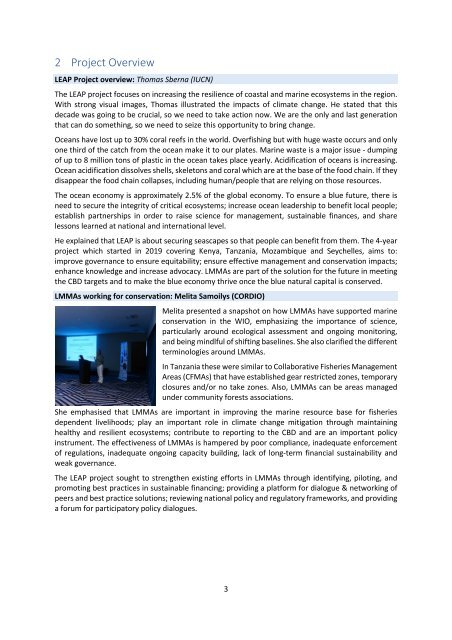EV2 Inception Workshop Report_CORDIO-IKI-IUCN_11.05.2020_TZA
Create successful ePaper yourself
Turn your PDF publications into a flip-book with our unique Google optimized e-Paper software.
2 Project Overview<br />
LEAP Project overview: Thomas Sberna (<strong>IUCN</strong>)<br />
The LEAP project focuses on increasing the resilience of coastal and marine ecosystems in the region.<br />
With strong visual images, Thomas illustrated the impacts of climate change. He stated that this<br />
decade was going to be crucial, so we need to take action now. We are the only and last generation<br />
that can do something, so we need to seize this opportunity to bring change.<br />
Oceans have lost up to 30% coral reefs in the world. Overfishing but with huge waste occurs and only<br />
one third of the catch from the ocean make it to our plates. Marine waste is a major issue - dumping<br />
of up to 8 million tons of plastic in the ocean takes place yearly. Acidification of oceans is increasing.<br />
Ocean acidification dissolves shells, skeletons and coral which are at the base of the food chain. If they<br />
disappear the food chain collapses, including human/people that are relying on those resources.<br />
The ocean economy is approximately 2.5% of the global economy. To ensure a blue future, there is<br />
need to secure the integrity of critical ecosystems; increase ocean leadership to benefit local people;<br />
establish partnerships in order to raise science for management, sustainable finances, and share<br />
lessons learned at national and international level.<br />
He explained that LEAP is about securing seascapes so that people can benefit from them. The 4-year<br />
project which started in 2019 covering Kenya, Tanzania, Mozambique and Seychelles, aims to:<br />
improve governance to ensure equitability; ensure effective management and conservation impacts;<br />
enhance knowledge and increase advocacy. LMMAs are part of the solution for the future in meeting<br />
the CBD targets and to make the blue economy thrive once the blue natural capital is conserved.<br />
LMMAs working for conservation: Melita Samoilys (<strong>CORDIO</strong>)<br />
Melita presented a snapshot on how LMMAs have supported marine<br />
conservation in the WIO, emphasizing the importance of science,<br />
particularly around ecological assessment and ongoing monitoring,<br />
and being mindlful of shifting baselines. She also clarified the different<br />
terminologies around LMMAs.<br />
In Tanzania these were similar to Collaborative Fisheries Management<br />
Areas (CFMAs) that have established gear restricted zones, temporary<br />
closures and/or no take zones. Also, LMMAs can be areas managed<br />
under community forests associations.<br />
She emphasised that LMMAs are important in improving the marine resource base for fisheries<br />
dependent livelihoods; play an important role in climate change mitigation through maintaining<br />
healthy and resilient ecosystems; contribute to reporting to the CBD and are an important policy<br />
instrument. The effectiveness of LMMAs is hampered by poor compliance, inadequate enforcement<br />
of regulations, inadequate ongoing capacity building, lack of long-term financial sustainability and<br />
weak governance.<br />
The LEAP project sought to strengthen existing efforts in LMMAs through identifying, piloting, and<br />
promoting best practices in sustainable financing; providing a platform for dialogue & networking of<br />
peers and best practice solutions; reviewing national policy and regulatory frameworks, and providing<br />
a forum for participatory policy dialogues.<br />
3


















